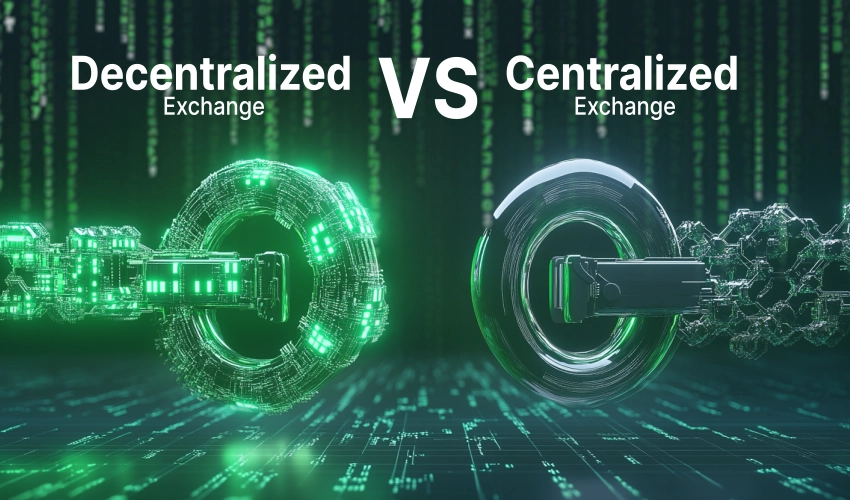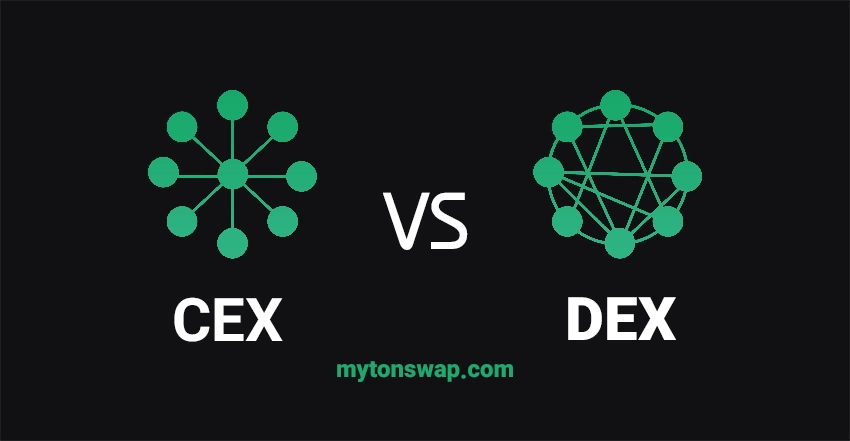
Centralized vs. Decentralized Exchanges: Key Differences Explained
When it comes to cryptocurrency trading, there are two main types of platforms: centralized exchanges (CEXs) and decentralized exchanges (DEXs). Understanding centralized vs. decentralized exchanges is crucial for making informed decisions about where to trade your digital assets. This guide explores the essential differences between these platforms, their advantages, challenges, and when to use each type.
What Are Centralized Exchanges (CEXs)?
Centralized exchanges function similarly to traditional financial systems, such as stock markets, by acting as intermediaries between buyers and sellers. Managed by companies, CEXs handle everything from order matching to custody of funds and transaction processing. Well-known examples include Binance, Coinbase, and Kraken.
Key Features of Centralized Exchanges:
Ease of Use:
CEXs offer user-friendly interfaces, making them ideal for beginners. The streamlined onboarding process allows new users to start trading quickly.Wide Variety of Cryptocurrencies:
CEXs provide access to a large selection of cryptocurrencies, from major ones like Bitcoin and Ethereum to numerous altcoins, enabling traders to diversify their portfolios.Regulatory Oversight:
Many CEXs operate under strict regulations, which can provide added security for users. Regulatory compliance often means that user funds are protected against fraud and mismanagement.High Liquidity:
With large trading volumes and user bases, centralized exchanges typically offer high liquidity. This means that trades are executed more quickly, even in times of market volatility, reducing the risk of price slippage.
When to Choose a Centralized Exchange:
- If You’re New to Crypto: The user-friendly design of CEXs makes them a great choice for beginners.
- For Access to Well-Known Coins: CEXs are perfect if you want to trade popular cryptocurrencies.
- If You Value Regulatory Protection: CEXs offer the reassurance of operating under legal frameworks.
What Are Decentralized Exchanges (DEXs)?
On the other side of the centralized vs. decentralized exchanges debate, decentralized exchanges eliminate the need for intermediaries. They utilize blockchain technology and smart contracts to facilitate peer-to-peer trading directly between users. Popular examples of DEXs include Uniswap, PancakeSwap, and SushiSwap.
Key Features of Decentralized Exchanges:
Decentralized Control:
Unlike CEXs, DEXs are not governed by a central authority. Users maintain full control of their funds, as transactions occur directly through smart contracts without relying on a third party.Enhanced Privacy:
Decentralized exchanges allow for anonymous trading, as most DEXs do not require KYC (Know Your Customer) verification. This is ideal for users who value privacy and wish to retain control over their personal data.Complexity for Advanced Users:
DEXs are more complex than CEXs and often require a deeper understanding of concepts like liquidity pools, gas fees, and slippage. While the learning curve is steeper, DEXs provide more control and flexibility for experienced traders.Early Access to New Tokens:
DEXs often list new tokens faster than CEXs, giving traders the opportunity to invest early in emerging projects. This makes them a popular choice for those looking to capitalize on new trends.
You might also like:
When to Choose a Decentralized Exchange:
If Privacy Is a Priority: DEXs are the best choice for those who wish to trade without providing personal information.
- For Advanced Traders: DEXs offer more flexibility but require more knowledge of the market.
- If You Want Early Access to New Coins: DEXs are ideal for discovering new and promising tokens before they hit CEXs.
Comparison Table: Centralized vs. Decentralized Exchanges

| Feature | Centralized Exchanges (CEXs) | Decentralized Exchanges (DEXs) |
|---|---|---|
| Control | Managed by a central authority | Users retain full control of their funds |
| Ease of Use | Intuitive and beginner-friendly | More complex, suitable for experienced users |
| Privacy | Requires identity verification (KYC) | Allows for anonymous trading, no KYC needed |
| Liquidity | High liquidity due to large trading volumes | Liquidity depends on user-contributed pools |
| Security Risks | Risk of exchange hacks and mismanagement | Risk of losing access to funds if private keys are lost |
| Access to New Tokens | Slower to add new tokens | Lists new tokens faster, ideal for early investment |
This table offers a concise overview of centralized vs. decentralized exchanges, highlighting the most important differences between the two types.
Security Considerations in Centralized vs. Decentralized Exchanges
When considering centralized vs. decentralized exchanges, it’s important to understand the different security challenges:
CEX Security Risks:
While CEXs have strong security measures, they are centralized entities that hold user funds, making them attractive targets for hackers. Incidents of exchange breaches can result in significant losses for users.DEX Security Risks:
With DEXs, users are responsible for managing their own wallets and private keys. Losing access to a wallet can result in permanent loss of funds. Additionally, vulnerabilities in smart contracts may expose users to risks.
Real-World Examples and Experiences
To better understand centralized vs. decentralized exchanges, here are some real-world experiences:
- Using a CEX: Many traders prefer platforms like Coinbase for their simplicity and ease of use. The downside is the need for KYC, which some users find inconvenient.
- Using a DEX: Traders using platforms like Uniswap appreciate the ability to trade a wide range of tokens directly, but they must navigate high gas fees and a more complex trading process.
The Future of Centralized vs. Decentralized Exchanges
As the world of cryptocurrency continues to evolve, both centralized and decentralized exchanges are adapting:
- Advancements in DEXs: Layer 2 scaling solutions and cross-chain trading are making DEXs faster and more cost-effective, providing better user experiences.
- CEXs Integrating DeFi Features: Many CEXs are incorporating features like staking and lending, offering a blend of centralized convenience with decentralized benefits.
Conclusion: Centralized vs. Decentralized Exchanges
In summary, understanding centralized vs. decentralized exchanges is key for optimizing your cryptocurrency trading strategy. Both have their strengths and challenges.
Centralized exchanges are ideal for those seeking ease of use, high liquidity, and regulatory protections. Decentralized exchanges, on the other hand, appeal to traders who value privacy, control over their funds, and early access to new tokens.
By staying informed about centralized vs. decentralized exchanges, you can make smarter choices that align with your trading goals and preferences. Whether you opt for the simplicity of a CEX or the autonomy of a DEX, understanding the differences will help you navigate the crypto market with confidence.




